#dashnaktsutyun
Text
NATIONAL-RELIGIOUS EXTREMISM AND POLITICAL TERRORISM OF THE NATIONALISTS AS A DRIVING FORCE OF THE ETHNOGENESIS OF THE ARMENIAN ETHNOUS
(OUTLINE OF SOCIO-POLITICAL HISTORY)
Олег КУЗНЕЦОВ Oleg KUZNETSOV КАВКАЗ & ГЛОБАЛИЗАЦИЯ 176 Том 8 Выпуск 3—4 2014
Translated by Saadat Karimi
Summary
Through the prism of the content of the process ethnogenesis of the Armenian people the issues of the influence of organized national-religious extremism, political terror and terrorism on the vector and intensity of modernization…
View On WordPress
#Armenian Apostolic Church#Armenian-Gregorian clergy#ASALA#Dashnaktsutyun#ethnogenesis#Hunchak#JCAG#national-religious extremism#political terrorism#Republic Armenia#secularization#social modernization
0 notes
Text
Саламов Ш. Н. «Крах»: национализм-антагонизм (2018)
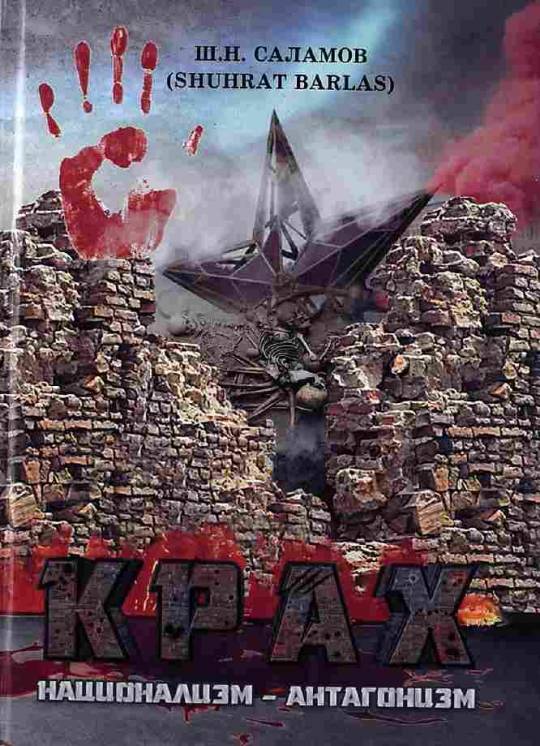
Саламов Ш. Н. «Крах»: национализм-антагонизм (2018) https://www.avetruthbooks.com/2023/01/salamov-sh-n-krakh-natsionalizm-antagonizm-2018.html?feed_id=9343
#History#Armenianterrorism#Dashnaktsutyun#EnverPaşa#HistoryofAzerbaijan#HistoryofUzbekistan#ShuhratBarlas#TurkicGenocide
0 notes
Text
June 14 is the Day of Remembrance of the Victims of Communist Repression in Estonia
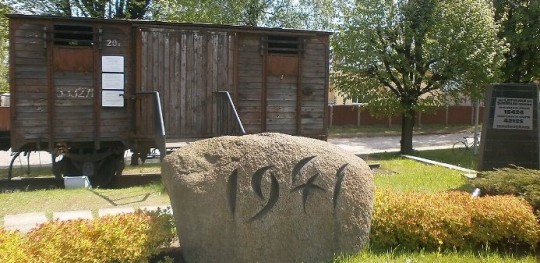
Monument to Latvian citizens deported on June 14, 1941 (Riga). The car in which the deportees were taken out. On the stone next to it is the number of people expelled in 1941 and 1949.
In Lithuania, this date is called the Day of Sorrow and Hope, in Latvia – the Day of Remembrance of the Victims of Communist Terror, in Estonia – the Day of Mourning.
On June 14, 1941, mass deportations began in the Baltic States. In mid-May 1941, the People's Commissar of Internal Affairs of the USSR, Lavrenty Beria, agreed with Stalin on a draft resolution of the SNK and the Central Committee of the CPSU (b) "On measures to cleanse the Lithuanian SSR of anti-Soviet, criminal and socially dangerous elements" (at the stage of approval, Latvian and Estonian were added to the Lithuanian SSR).
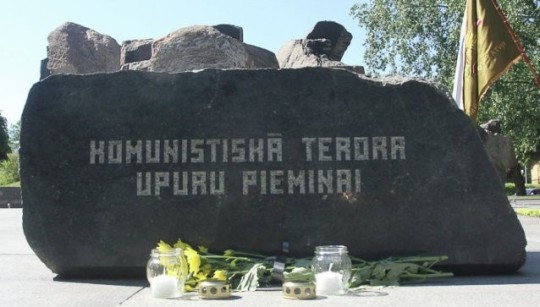
Former members of various nationalist parties, policemen, gendarmes, landlords, manufacturers, high-ranking officials, officers and criminals conducting anti-Soviet activities and used by foreign intelligence services for espionage purposes were subject to resettlement. Such people had to be arrested, their property confiscated and sent to camps for a period of five to eight years, followed by settlement for 20 years in remote areas of the USSR. Their family members (except criminals), as well as family members of those who were sentenced to capital punishment or escaped from justice and moved to an illegal position, would have been waiting for them there.
On June 14, 1941, a forced relocation operation began in Lithuania, Latvia and Estonia. 17.5 thousand people from Lithuania were deported to the Novosibirsk region, Kazakhstan and Komi ASSR, about 17 thousand people from Latvia – to the Krasnoyarsk Territory and Novosibirsk region, as well as to the Karaganda region of Kazakhstan, about six thousand people from Estonia – to the Kirov and Novosibirsk regions.
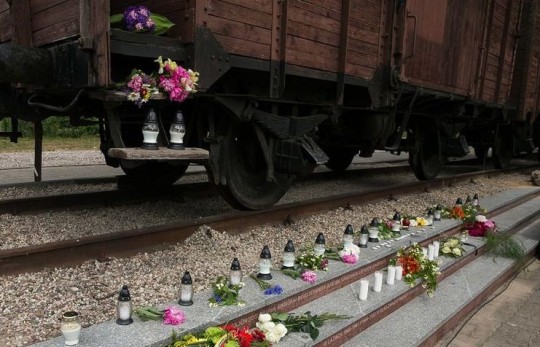
After the end of the war, repressive policies, including forced relocations, intensified again in 1947 and noticeably intensified in 1948. In total, in 1940-1953, more than 203 thousand people were sent from the Baltic States to special settlement, including 118599 people from Lithuania, 52541 people from Latvia and 32540 people from Estonia.

In Armenia, June 14 is also honored by victims of communist repression, but this day was called more politically correct there - the Day of Protection of the Rights of Innocent Convicts. This memorable date appeared in Armenia on the initiative of the Dashnaktsutyun party in memory of those repressed during the Soviet era.
*Translated using an electronic dictionary. The original text in Russian and much more on the criminal topic can be selected on the main page of the site - http://crimerecords.info/
2 notes
·
View notes
Photo

Garegin Nzhdeh Full name Garegin Yeghishe Ter-Harutyunyan Birth January 1 , 1886 Kznut , Nakhichevan Death December 21 , 1955 Vladimir , Russia Garegin Nzhdeh, real name Garegin Yeghishei Ter-Harutyunyan ( January 1 , 1886 - December 21 , 1955 ) was an Armenian statesman, military figure, political scientist and philosopher. He was born in the village of Kznut (now Kuznut) in the Armenian province of Nakhichevan .Biography "To live and act only for what is worth dying for, & to die only for what is worth living for" Garegin Nzhdeh is known to the general public primarily as a military leader and statesman, and as a thinker only partially presented with his profound and concise sayings. The latter circumstance does not allow to imagine his image as a whole, so the great significance of his caring heritage is not realized. Nzhdeh is one of the unique figures in our history, in whom the military and the thinker, the national moralist and the politician have harmoniously merged, who, with his truly historical life, is definitely among the first great Armenians. Nzhdeh (Garegin Ter-Harutyunyan) was bornJanuary 1 , 1886in the village of Kznut, Nakhichevan province. After receiving his primary education at a Russian school in Nakhichevan, he continued his education at the Russian Gymnasium in Tbilissi (Georgia), where he joined the Armenian liberation movement at the age of 17. Then he moved to St. Petersburg, studying at the law department of a local university for two years, leaving the university and devoting himself entirely to the cause of the Armenian revolution against tsarism and sultanate. In 1906 he moved to Bulgaria, where with the support of Rostom, with the mediation of the leaders of the Macedonian liberation movement, he was admitted to the officer's school in Sofia, and after graduating in 1907, he returned to the Caucasus. 1907-1908 He joined the ranks of the ARF Dashnaktsutyun and took part in the Persian revolutionary movement. Nzhdeh in 1909 for transporting weapons and ammunition. He returned to the Caucasus and was arrested by the tsarist authorities. After spending more than three years in prison, he moved to Bulgaria. When the First (truncated) (at Armenia and regions / Армения и регионы / Հայաստան եվ մարզեր) https://www.instagram.com/p/CfQbDDNOdBN/?igshid=NGJjMDIxMWI=
0 notes
Text
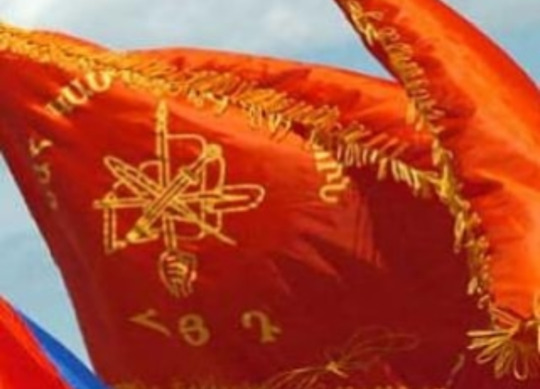
Ականջ ունեցողը թող լսէ, խելք ունեցողը թող լաւ մտածէ❗️
«Բոլոր անոնք, որոնք տուրք տուին Դաշնակցութիւնը Հայաստանի քաղաքական կեանքէն դուրս գրելու հերթական փորձութեան, ամէն օր իրենց նախատեսութեան անհեթեթութեան վկան պիտի դառնան:
Համահայկական օրակարգին մէջ նշանակալի ներդրում ունենալու Դաշնակցութեան կարողութիւնը աւելի կը շեշտուի կուսակցութեան սփիւռքեան կառոյցի բոլոր օղակներու ամէնօրեայ՝ հայապահպանումէն սկսեալ մինչեւ քաղաքական բազմաճակատ գործունէութեամբ:
Դաշնակցութեան դերակատարութիւնը նսեմացնելու անպտուղ վարժանքէն հրաժարիլը, միայն կ՛օգնէ մեր ժողովուրդին ու պետութեան»:
#armenia#հայաստան#հյդ#դաշնակ#դաշնակցական#դաշնակցութիւն#tashnag#tashnagtsagan#dashnak#dashnaktsutyun#arf#armenian revolutionary federation
0 notes
Text
im so fucking angry seeing dashnaktsutyun protests in yerevan like there's just no fucking hope for armenia is there
4 notes
·
View notes
Link
A classical dictum cited by Clausewitz, the father of war studies as an academic discipline, tells us that starting a war is often easy while ending it is always difficult. Does that dictum apply to the war that Turkey has started against the Kurds by invading Syria? Right now, the answer is that no one knows. What is certain, however, is that the best outcome that Turkey might expect, is to be extricated from that hornet's nest with a minimum of damage. While the war could be blamed on Turkish President Recep Tayyip Erdogan's autocratic style of decision-making, the deeper roots of the conflict must be sought in Turkey's centuries-old Kurdish obsession.
That obsession was present, albeit in embryonic form, even during the Ottoman era, when the Sultan-Caliphs harbored suspicions about their Kurdish subjects on ethnic and religious grounds. Even when drawn into military service, Ottoman Kurds could not, or would not, be assimilated into the dominant Ottoman-Turkish identity. Subscribing to a variety of religious beliefs and traditions, including Alawism, Zoroastrianism, Yazidism and a panoply of Sufi orders stretching from the Balkans to Central Asia, the Kurds would not fit into the official Islamic identity of the empire.
In that context, we had the clash of two identities, one hard, the other soft. The Ottoman identity was soft because the empire consisted of numerous ethnic and religious groups. The ruler used the title of Sultan for his ethnic Turks, Qaysar (Caesar) for Christians, Padshah for Iranic and/or Shiites and Caliph for Sunni, mostly Arab, subjects.
During the First World War, the Ottomans concluded a tactical alliance with the Kurds to repress and expel the Sultan's Armenian subjects from chunks of southeastern Anatolia. The rationale for that campaign, later to be known as the Armenian Genocide, was that some Armenians, led by the nationalist Armenian Revolutionary Federation (Dashnaktsutyun) sided with Russia in the war against the Ottomans by launching a series of attacks in Anatolia. With resources stretched in European and Middle Eastern theaters of war, the Ottoman Empire had to enlist Kurdish irregulars to crush the Armenian revolt in several major battles.
However, the end of First World War left the Kurds in an even worse situation than before. President Woodrow Wilson's promise of "self-determination" was soon forgotten, leaving behind the dream of independence on the Kurdish side and the fear of Kurdish secession in the Ottoman camp as reconstituted as the Turkish Republic under Mustafa Kemal pasha (Ataturk).
The new identity that Ataturk wished to create was based on what his French advisers named "Turkitude" (Turkishness) and thus free of religious (i.e. Islamic) connotations. A new alphabet based on the Latin script signaled the start of a campaign to invent a new Turkish language as well, purged of Arabic and Persian words as much as possible. Ataturk's "secular" system severed the thin religious bond that existed between the Kurds and the rest of the new republic's citizens. The trouble was that the Kurds would not adopt the new Turkish language that Ataturk had ordained, preferring to hang on to their own three native Kurdish languages.
In much of history, at least until recently, systems sustained by ultra-nationalist and/or nativist ideologies have always seen "otherness" as a threat rather than an opportunity of cultural and social enrichment.
During the decline of the Ottoman Empire, becoming known as "the sick man of Europe", the search for a new imperial identity intensified. In the late 1880, a Jewish Hungarian scholar, Arminius (Hermann) Vambery, who had spent years travelling in the empire, invented the concept of pan-Turkism, in later versions pan-Turanism, and managed to sell it to the "Young Turks" and their political organization, known as the Committee of Union and Progress. Western powers, notably Great Britain and France, supported the concept of pan-Turanism as a counter-balance to pan-Germanism led from Berlin, pan-Slavism led by Russia and pan-Islamism led by Muslim movements opposed to Western colonial domination in North Africa, the Middle East and India.
Once again, the Kurds preferred to remain "the other", rejecting pan-Turanism as an excuse for ethnic Apartheid at their expense. That made them targets for attacks by pan-Turkist and pan-Turanist thinkers who designated the Kurds as enemies. Pan-Turanists had replaced the word Ummah (Islamic community) with Khalq (People) to designate the nation. The Basmachi terrorist movement led by Enver Pasha, a hero of pan-Turkism and possibly an agent of British Intelligence, even denied the existence of a Kurdish people, inventing the term "Mountain Turks" instead.
Suspicion and hatred of Kurds led to more and more repression, to the point that by the mid-1960s even the use of the word "Kurd" in publications and/or public discourse had become an offense punishable by law. In the 1960s, a new movement, known as "Grey Wolves" (Bozkurtlar in Turkish), later led by Alparsalan Turkesh, was even advocating ethnic cleansing armed at moving large chunks of the Kurdish community out of their ancestral lands in eastern Anatolia to other parts of Asia Minor. One scheme discussed was to replace the expelled Kurds with "Turkic" Muslims, notably ethnic Albanians, from Yugoslavia where the Communist regime was also interested in ethnic cleansing against Muslims in Bosnia-Herzegovina and Macedonia. The scheme died after it was met with strong opposition from a chunk of Turkish political elite in Ankara and Iran under the Shah.
In its current avatar as Islamic Republic, Iran has adopted a sympathetic posture vis-à-vis Erdogan's anti-Kurdish war. An editorial published by Fars News, an organ of the Islamic Revolutionary Guard Corps (IRGC) last week, urges sympathy for Erdogan because of his "anti-Zionist speech at the UN General Assembly and defense of the suffering Palestinian nation". It praises Erdogan's "humanitarian efforts to break the siege of Gaza". More importantly, the IRGC editorial says Erdogan ignored Turkey's secular system by providing free land and a check of $1 million for the construction of "the huge Zayn al-Abedin Shiite mosque" in Istanbul.
Erdogan's efforts to ethnically cleanse the Syrian Kurds may not be justifiable, but one must appreciate the Turkish leader's "personal presence in the 500,000-person assembly of mourners for Imam Hussein in Istanbul." In other words, one can commit genocide as long as one makes a speech in favor of Palestine and attends a Shi'ite chest-beating ceremony. This is how some in our region see the world in this bizarre world of the 21st century.
9 notes
·
View notes
Text
Robert Kocharyan forms alliance with ARF Dashnaktsutyun and Reviving Armenia Party
New Post has been published on https://armenia.in-the.news/politics/robert-kocharyan-forms-alliance-with-arf-dashnaktsutyun-and-reviving-armenia-party-73178-09-05-2021/
Robert Kocharyan forms alliance with ARF Dashnaktsutyun and Reviving Armenia Party
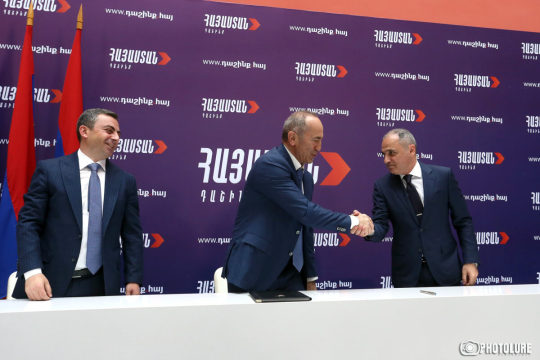
Armenia’s Second President Robert Kocharyan, representative of the Supreme Body of the Armenian Revolutionary Federation Dashnaktsutyun Ishkhan Saghatelyan and President of the Reviving Armenia Party signed a memorandum on forming an alliance for teh forthcoming snap parliamentary elections.
Kocharyan said “professionalism, experience, diligence, discipline and love for the country” will be the guarantee for their success.
He promised that the creation of tens of thousands of new jobs every year will be a priority, everything will be done for the development of small and medium businesses. He pledged a science-based economy and developed agriculture, and noted that sdrastic improvement of the quality of life of all citizens will become a priority.
The signing ceremony was followed by a rally at the Freedom Square.
Members of the ‘Armenia’ Alliance hold a rally dedicated to the Victory Day on Freedom Square of Yerevan, Armenia
Read original article here.
0 notes
Photo

New Post has been published on https://massispost.com/2021/05/kocharian-and-arf-confirm-election-alliance/
Kocharian and ARF Confirm Election Alliance

YEREVAN — The Armenian Revolutionary Federation (Dashnaktsutyun) and another opposition party officially…
0 notes
Text
USTED, REFIRIENDO A ARMENIA, DIJO "ESTA LLAMADO". ¿POR QUÉ EXPRESASTE ESTO EXACTAMENTE?
Por Geidar Dzhemal
Traducción de Juan Gabriel Caro Rivera
Pregunta:
¡Estimado Geidar Dzhahidovich!
Soy nativo de Bakú, armenio por nacionalidad. Usted se mudó a Moscú en 1979, mucho antes de que comenzaran los eventos, o “problemas”, como solía decir mi madre. Considero a Azerbaiyán mi única patria y estoy muy triste por no poder llegar allí, ni siquiera puedo comprar un boleto, como saben. Personalmente, Geidar Dzhahidovich, para mí es una autoridad absoluta en los temas que tradicionalmente cubre. Hoy, cuando se está desarrollando el tema de Siria y, en particular, el de Karabaj, yo personalmente no tengo suficiente información para entender lo que está sucediendo, estoy esperando y buscando sus explicaciones y comentarios. Estoy absolutamente convencido de que no soy el único que trata tu profesionalidad de esa manera, somos muchos de nosotros, personas que no somos indiferentes y que tenemos dificultades para hacer frente a todas las corrientes de mentiras que vienen de todos lados que dependemos de ti personalmente. Con especial atención, acabo de conocer su evaluación de lo que está sucediendo en Azerbaiyán sobre la cuestión de Karabaj. Sin embargo, me pareció muy interesante, como siempre. Pero surgió una pregunta que no puedo dejar de hacerte: Geidar Dzhahidovich, cuando mencionaste a Armenia, dijiste “supuesta”. ¿Puede decirnos por qué usted, un conocedor tan profesional y autorizado, lo expresa de esta manera? Debo señalar, Geidar Dzhahidovich, que soy uno de esos armenios de Bakú que nunca (!!) ha tenido vínculos familiares y amistosos en Armenia. Y ahora lo soy. He estado en Ereván 3 veces en toda mi vida, en total 7 días completos. Digo esto para no dar la impresión de que te hago esta pregunta por celos. Espero con ansias su respuesta, aunque comprendo su ajetreo. Les deseo todo lo mejor, lamento molestarlos.
Responder:
Hola D***. Con mucho gusto explicaré por qué llamé así a “Armenia”. La Armenia histórica nunca ha existido en el territorio del Kanato de Ereván. Como se sabe por cualquier libro de texto de historia, estas tierras fueron parte de Irán hasta 1828, después de la derrota de Teherán, el Imperio Ruso se apoderó de estos territorios y comenzó a reasentar a los armenios allí, como contrapeso a los musulmanes. Legalmente, Armenia surgió en el sitio de Ereván debido a la estupidez de los musavatistas (1), quienes con un gesto amplio brindaron tal oportunidad a los Dashnaks (2), porque ingresaron a la Internacional Socialista con ellos. En "gratitud", los Dashnaks inmediatamente comenzaron una guerra contra ellos. Esto es lo que puedo decir en respuesta a su pregunta.
Notas del Traductor:
1. Existen dos partidos políticos en Azerbaiyán que se conocen con el nombre de "Musavat" (en azerí Müsavat - del árabe (مساواة) " Igualdad ") . En 1911, se fundó en Bakú el Partido Democrático Musulmán Musavat (Igualdad), cuyos fundadores fueron M. Rasulzade , V. Mikailzade, G. Sharifzade y A. Kyazimzade . El partido fue fundado por ex miembros del grupo socialista Gummet . Hasta la Revolución de febrero, el partido se vio obligado a operar en la clandestinidad. A los miembros del partido se les dio la tarea: "mantener la existencia del partido en estricto secreto y, limitándonos a aumentar el número de sus miembros, preparar y ganar fuerzas para la lucha futura". Durante la Primera Guerra Mundial, los líderes del partido Musavat de las páginas del periódico Achyk suz pidieron a los musulmanes que libraran una guerra con el Imperio Otomano "hasta el amargo final". Al mismo tiempo, Rasulzade defendió una identidad turca (“Somos turcos por lengua, turcos por nacionalidad”), pero este pan-turquismo tenía una base rusa y estaba arraigado en el modernismo islámico de Gasparinsky y significó un giro de los turcos “de La Meca hacia el Altai” . Los turcos significaban una sola nación (mijo), que abarcaba a los turcos, azerbaiyanos, kazajos y uzbekos. Además, los turcos azerbaiyanos eran entendidos como shirvans, residentes de Bakú, residentes de Ganja, residentes de Iravan, residentes de Borchali (Georgia) y residentes del noroeste de Irán. Antes de la revolución de febrero, Musavat no exigió la creación de un Estado turco independiente, limitándose a los ideales de autonomía cultural y nacional.
2. La Federación Revolucionaria Armenia (ARF), Dashnaktsutyun ( Armenia Հայ Յեղափոխական Դաշնակցութիւն (Հ.Յ.Դ.) - "Unión Revolucionaria Armenia" ) es uno de los más antiguos partidos políticos armenios . Fue creado en 1890 en Tiflis , operado en el territorio del Imperio Ruso , el Imperio Otomano ( Turquía ), Irán , Estados Unidos y varios países europeos . El nombre oficial en ruso es Federación Revolucionaria Armenia "Dashnaktsutyun" (ARF "Dashnaktsutyun"). En la etapa inicial, se propuso el objetivo de lograr la libertad económica y política de la Armenia turca a través de una "guerra popular contra el gobierno turco". Usaba la propaganda, la preparación revolucionaria del pueblo, la organización y el armar a la población armenia del Imperio Otomano para la autodefensa, el sabotaje y el terrorismo individualista que propusieron como medios para lograr sus objetivos. Los métodos terroristas se utilizaron no solo en el territorio del Imperio Otomano, sino también en la Transcaucasia rusa durante la Primera Revolución Rusa (1905-1907). A principios del siglo XX, durante la lucha contra el régimen del sultán Abdul-Hamid II, el ARF cooperó con los Jóvenes Turcos y comenzó a utilizar formas legales de actividad política . En 1907, se decía que el partido tenía 167.000 miembros.
En 1918-1920, Dashnaktsutyun fue el partido gobernante en la República de Armenia , que surgió como resultado del colapso del Imperio Ruso. En diciembre de 1920, como resultado de la invasión militar de los kemalistas turcos y las tropas soviéticas, la República de Armenia dejó de existir. Las unidades armadas de nacionalistas armenios en el territorio de Zangezur continuaron luchando contra el poder soviético hasta que finalmente fueron derrotados por las tropas soviéticas. Tras la caída de la república, el partido continuó sus actividades con posiciones antisoviéticas en el exilio. Durante la Segunda Guerra Mundial , los miembros del partido en Berlín colaboraron con los nazis.
La actividad política legal del partido en el territorio de Armenia y la República de Nagorno-Karabaj no reconocida se restableció durante el período de la "perestroika", en la segunda mitad de los años ochenta. A finales de la década de 1980 y principios de la de 1990, los activistas de Dashnaktsutyun participaron activamente en el conflicto de Karabaj . En el período 1994-1998, se prohibieron las actividades del partido en el territorio de Armenia. Dashnaktsutyun es el partido político más grande de la diáspora armenia. En 1907-1960, "Dashnaktsutyun" fue miembro de la Internacional Socialista . Desde 1996, vuelve a participar en su labor como observador, en 1999 obtuvo el estatus consultivo y desde 2002 ha restablecido su membresía plena en esta organización.
0 notes
Text
Turkey's involvement in the Karabakh conflict could harm Azerbaijan, warns journalist Rovshan Aliyev
New Post has been published on http://khalilhumam.com/turkeys-involvement-in-the-karabakh-conflict-could-harm-azerbaijan-warns-journalist-rovshan-aliyev/
Turkey's involvement in the Karabakh conflict could harm Azerbaijan, warns journalist Rovshan Aliyev
Should Azerbaijanis be wary of their close friend's embrace?
Turkish President Recep Tayyip Erdoğan meets Azerbaijani President IIham Aliyev in Baku, February 2020. Photo CC-BY-4.0: President.Az / Wikimedia Commons. Some rights reserved.
This isn't the first time in recent years when fighting has flared up in Nagorno-Karabakh. But what is new, observers say, is the scale of the latest clashes — which can now be more accurately described as a full-blown war. Regional power brokers are also playing an increasingly important role in the conflict. If Armenia's ally Russia has remained uncharacteristically remote, the same cannot be said for Azerbaijan's close partners in Ankara. Turkey has offered extensive political and likely military support to Azerbaijan in recent weeks. International media have reported that mercenaries from Turkish controlled areas of northern Syria have been transferred to the South Caucasus to fight on Baku's side — reports which the Azerbaijani authorities have roundly dismissed. Turkey and Azerbaijan share the smallest of borders — Azerbaijan's exclave of Nakhchivan borders eastern Turkey, though Nakhchivan is itself separated from Azerbaijan proper by Armenia and Iran. For decades, they were also divided by the Iron Curtain; Azerbaijan came under Soviet rule in 1920 and Turkey became a NATO member state in 1952. However, Turkey and Azerbaijan also share Turkic roots, very similar languages, and a shared narrative about the Nagorno-Karabakh conflict. Turkey was the first to recognise Azerbaijan as independent after the collapse of the Soviet Union. Meanwhile, its relations with Armenia are officially non-existent; the long border between the two countries has been closed since the first Karabakh War in the early 1990s. Importantly, Turkey's refusal to recognise the events of 1915 as an act of genocide continue to infuriate Armenian public opinion. In this context, it is not surprising that Ankara remains a staunch supporter of Baku. But observers are increasingly wondering: why now? Why on this scale? And what role does domestic Turkish politics play? To understand more, I spoke to Rovshan Aliyev, a former Radio Free Europe journalist from Azerbaijan who currently works as a media trainer in the Czech capital of Prague. This interview has been edited for brevity and style.
Rovshan Aliyev, photo used with permission.
Filip Noubel (FN): In what way is the escalation that started on September 27 different from previous bouts of fighting between Azerbaijan and Armenia?
Rovshan Aliyev (RA): Well, this is not a routine disruption of the [1994] ceasefire, something that has been happening occasionally on the frontline for years. This is almost a full-scale, continuous military operation. During previous standoffs, even in the most recent one in 2017, Armenia never openly threatened Azerbaijan with a military intervention to Azerbaijan, saying that the forces holding Azerbaijani territories are the self-defence army of Nagorno-Karabakh. But this time, we see a policy change, as Armenia is no longer hiding its direct involvement. On March 30, the Armenian Defence minister David Tonoyan declared that his country must prepare for “a new war for new territories” on the website Aravot.am. In May, Armenian Prime Minister Nikol Pashinyan participated in an inauguration event in Shusha, a city in Nagorno Karabakh that holds special significance for Azerbaijanis as a cultural centre and a place formerly inhabited almost exclusively by Azerbaijanis which has been since ethnically cleansed. More recently, Pashinyan's wife, Anna Hakobyan also posed on social media holding a Kalashnikov rifle. Finally, in July, Armenian forces also shelled the region of Tovuz, which is situated inside Azerbaijan.
FN: Why is Turkey so prominently and openly supportive of Baku this time? What does it mean for Turkey’s ambitions and for Azerbaijan’s politics?
RA: Turkey was always supportive [of Azerbaijan] in terms of politics and diplomacy, but did not display direct military support. In 1991, Turkey recognised the independence of Armenia, but after Armenian forces occupied territories around Nagorno Karabakh, that is an additional seven districts of Azerbaijan, Turkey closed its border with Armenia. This was a form of economic sanction, but not a full-scale one, as to this day, the trade turnover between Turkey and Armenia amounts to several hundred millions of US dollars.
This time it seems that Turkish president Recep Tayyip Erdoğan wants to go beyond words and to support Azerbaijan with hardware. But I think such cooperation might harm more Azerbaijan than help it. Authoritarian leaders like Erdoğan try to take advantage of every situation, so Azerbaijan must be careful as Turkey’s direct involvement may complicate the conflict even more. So far, I don’t see any proof that the Turkish air force is directly involved. Concerning military equipment sales, it is not a secret that each side buys the weapon from several countries: Russia sells weapons to Azerbaijan, and sends more to Armenia for free, via Iranian territory. Azerbaijan has a US$1.6 billion contract with Israel, while Serbia has sold weapons to Armenia.
FN: Do you think Russia is unable or unwilling so far to impose a ceasefire, perhaps because of Pashinyan’s ambiguous position towards Armenia’s dependency on Russia?
RA: The previous political tandem in Armenia of President [Robert] Kocharyan and Prime Minister [Serzh] Sargsyan, the leaders of Russia and Armenia had a mutual understanding for many years, despite their interests being so different. In my opinion, the new Armenian leader Pashinyan [who came to power in 2018] felt himself alienated from this trio. As the revolutionary euphoria diminished in Armenia, the social, and then political crisis deepened, so Pashinyan desperately started to play the Karabakh card. I think he calculated that militarist behaviour might help him strengthen his position in Armenia. But Russia’s more neutral behaviour when compared to previous times shows that Pashinyan has miscalculated.
FN: In your view, what are the most optimistic and pessimistic scenarios for the coming days and weeks? Furthermore, Do you see space for dialogue in Azerbaijan and in Armenia? What voices are calling for it? If so, whose and where?
RA: I think [the conflict] will be shorter than Azerbaijan wants, but longer than Armenia and its international allies want. I always believed in people's diplomacy, but the governments of all three countries have hindered such initiatives. On the Armenian side, most people are prisoners of the militarist ideology of the Dashnaktsutyun party, that has suppressed alternative voices. This group has fuelled the conflict from abroad, published many books, falsified many historical facts, and filled libraries with charged literature, particularly during the Cold War. Western powers were interested in the collapse of the USSR, thus the Dashnaktsutyun ideology was very suitable for this purpose. I’m against communism and the USSR, but I’m against using ethnic discrimination and ethnic conflicts to achieve their demise. The Azerbaijani rhetoric, including the militaristic and hateful speech which we see in the media, is a reaction to this Dashnaktsutyun propaganda. It is not a rational reaction.
Therefore, I personally know many Armenians, like Filip Ekozyants, a brave Armenian intellectual, who must be supported as alternative voices. Azerbaijani and Armenian people need a common project to find out ways to bring their positions closer. We must recognise that a century ago, Ottoman officials decided to deport Armenian people from their homes, and it resulted in a catastrophe, even some don’t want to use the word genocide. But we must also recognise that Azerbaijanis were not participants in this. A century ago two empires disintegrated: in the Ottoman Empire Armenians suffered, while in the Russian Tsarist Empire, Azerbaijanis suffered. Thus if some Armenians think that they must take revenge for Ottoman crimes in Nagorno Karabakh and other Azerbaijani territories, this notion is unrelated, unacceptable, and ridiculous. On the other hand, Azerbaijanis must be vigilant in order not to support neo-Ottoman rhetoric spread by Erdoğan supporters.
Read an interview with the Armenian politician and analyst Mikayel Zolyan here
Written by Filip Noubel
0 notes
Text
The election campaign in Artsakh and its potential impact on the conflict
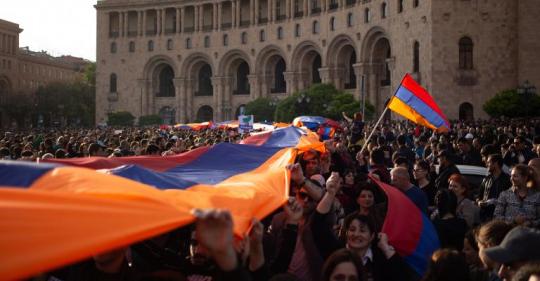
The upcoming elections in Artsakh promise to be an important event of this year. The election of the president, parliament and local governments will be held in late March and will mark the entry into force of the new Constitution of the unrecognized republic, adopted in 2017. After that, the NKR will finally become the presidential republic. At a joint meeting of the national security councils of Armenia and Artsakh, Pashinyan said that the campaign should be free and in accordance with democratic principles.
The main struggle for the presidency is between former Prime Minister Araik Harutyunyan, NKR National Assembly Speaker Ashot Ghoulian, NKR National Security Council Secretary Vitaly Balasanyan and NKR Foreign Minister Masis Mayilyan. The ARF party “Dashnaktsutyun” also announced its participation in the elections. The head of the party, the deputy of the National Assembly, David Ishkhanyan, was nominated as a candidate for president.
The main contender for the victory is Harutyunyan, who is the head of the ruling party “Free Homeland” and has shown his loyalty to Pashinyan in public statements. Despite this, it is strategically beneficial for Pashinyan to see President Artsakh Mayilyan, who is not associated with the old regime, or Gulyan, who is neutral in relation to Yerevan and enjoys the support of the population.
Under the new NKR Constitution, the president is able to concentrate all political power in his hands, taking the post of president and majority in parliament, and, if desired, achieve greater independence from Yerevan. Harutyunyan has all the necessary tools for this. In this situation, new conflict situations are possible between the elites of Armenia and Artsakh. As for Balasanyan, Nikol Pashinyan does not favor him at all, resented by some direct statements by the general. Taking the most radical position, Balasanyan accuses Yerevan of a defeatist position on the settlement of the Karabakh conflict. It is unlikely that this approach will provide widespread support for this candidate.
In any case, for the further settlement of the Armenian-Azerbaijani conflict, it is important that the elections in Artsakh be held without outside interference and end the “nervous” period in inter-elite relations. Given the possible activities of forces interested in artificially boosting passions in Artsakh, as well as the provocative activities of the Sasna Tsrer party, the potential for the impact of the election campaign on the state of conflict is, to put it mildly, not small.
At the same time, the evolution of the views of the new political elite of Armenia on the settlement of the Karabakh conflict, which does not suit everyone in Artsakh, continues. It began with the use of the concepts of “status” and “security” in diplomatic routines, providing a wide field for interpretation, including the notorious “surrender of territories”. In January 2019, Pashinyan declared the formula “territories in exchange for peace” unacceptable to the new government of the country. On March 30, Armenian Minister of Defense David Tonoyan at a meeting with the Armenian community in New York announced a change in the wording “territory for peace” to “new war - new territories”.
Nevertheless, during 2020, the concretization of the positions of Armenia on the settlement of the Karabakh conflict will continue, but the “humanitarian pauses” of the Karabakh conflict allow the idea of routinizing the conflict in its modern framework. The positions of the parties to the conflict are becoming more and more tightened, but the resumption of a regional conflict in the conditions of instability around the South Caucasus is not beneficial for both the states of the region and external players.
0 notes
Text
Voltaire and the Armenian Revolutionary Federation
Well, the title might be a bit misleading as Voltaire was not a contemporary of the Armenian Revolutionary Federation (ARF-Dashnaktsutyun) but in recent weeks Diasporan and Armenia’s media is full of irate Dashanks demanding.
What they are demanding is as unclear for them as it is for the rest of us, but I can’t help but to remember Voltaire who while talking about the Holy Roman Empire, supposedly said “The Holy Roman Empire is neither Holy, nor Roman, nor an Empire.“
Paraphrasing Voltaire I couldn’t but help to think that the Armenian Revolutionary Federation is neither revolutionary, nor federated and sometimes I even question what aspect of “Armenianness” it professes.
More often than not, it feels that the ARF is out to find enemies where there are none (sort of like Don Quixote fighting windmills thinking they are giants) or acting and feeling like victims (as that’s the mode they are able to best operate in).
Having lived in various communities I had the chance to intimately familiarize myself with various Armenian organization (both in the Diaspora and in Armenia) among which: the ARF (in both Armenian and Diasporan contexts); AGBU; the Republican Party of Armenia; Civil Contract and others (no I’m not name-dropping, I just have worked with the organizations and the people). If these multi-temporal and multi-local experiences taught me one thing, it’s that the goals, operations and management of Armenian organizations are rarely what they seem by the outside world and that they have more things in common with each other than people think.
maybe a post or two or three or four on those issues at some future point!!!
0 notes
Photo

drawing the Armenian Genocide: January 3, 1917
Sargis Barsegyan (Shamil) was a member of Dashnaktsutyun party. On April 24, 1915 he was among the first arrested leaders of the Dashnaktsutyun party. Was exiled in Ayash. Was killed in surburbs of Ankara.
(link)
2 notes
·
View notes
Photo
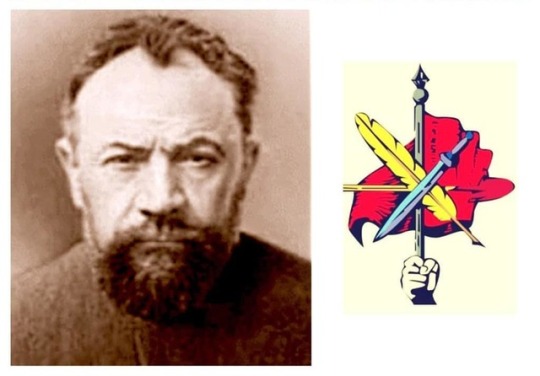
Rostom: The unrivaled revolutionary Ռոստոմը (Ստեփան Զօրեան)՝ միակ հայ յեղափոխականը որ կարեւոր ու ղեկավար դերակատարութիւն ունեցաւ 3 բռնապետական կայսրութիւններու դէմ (Ցարական, Պարսկական, եւ Օսմանական) ծաւալող յեղափոխութիւններու մէջ: Ան նաև աշխարհի պատմութեան մէջ այն տիպարն է որուն բռնապետութեան դէմ լայնածաւալ ու տարիներու վրայ երկարող պայքարը իւրայատուկ է, և որուն նմանը չէ եղած` մինչև իսկ Չէ Կեվարաներու տիպարով: Ռոստոմը Դաշնակցութեան հիմնադիր երրորդութիւնէն միակն է որ ապրեցաւ լսելու Հայաստանի անկախացման լուրը, բայց որ ինք ևս չհասաւ ոտք դնելու ազատագրուած հայրենիքի հողին վրայ: Մահացաւ Յունուար 1919-ին Թիֆլիսի մէջ, 52 տարեկան հասակին` յետ հիւանդութեան: Ռոստոմի տիպարը որպէս զինեալ պայքարի կազմակերպիչ` բայց նաև ներհուն մտաւորական, լիարժէք կերպով պէտք է ներկայացուի ոչ միայն հայ իրականութեան մէջ, այլ նաև միջազգային հանրութեան համար: Այս պէտք է մարտահրաւէր դառնայ պատմագիտութեան, լրագրութեան, գեղարուեստի, և ֆիլմարուեստի մարզերուն մէջ գործող մեր բոլոր հայրենակիցներուն համար, բայց յատկապէս մեր երիտասարդներուն համար: --------------------------------------- Rostom: Stepan Zorian. The only Armenian revolutionary to have played an important and leading role in revolutions against three tyrannical empires (Tsarist, Persian, and Ottoman). He is a unique figure and a historical phenomenon, as no other figure in history- not even the likes of Ernesto “Che” Guevara- has had the years and depth of activity against oppression and tyranny. Rostom is the only one of the Dashnaktsutyun founding trinity to have lived to hear the news of Armenia's independence, but he too was unable to set foot in his liberated homeland, as he died of typhus in Tbilisi in January 1919, at the age of 52. Rostom's persona as a successful organizer of armed resistance, but also of an accomplished intellectual should be fully introduced not only to the Armenian audiences, but also to the international community. This should be a challenge for all of us, but particularly to the youth working in the areas of history, journalism, art and filmmaking. - Viken Hovsepian https://www.instagram.com/p/B3mrrB9nmkq/?igshid=nlz0z7v0jto9
0 notes
Text
Ukraine faces new conflict: activists bombed the Ukrainian Embassy in Yerevan
Ukraine faces new conflict: activists bombed the Ukrainian Embassy in Yerevan
[ad_1]
<!-- ->
Ukraine faced strong protest from Armenian activists in Yerevan. A youth union called “Dashnaktsutyun” took part in the rally because of comments by the Ukrainian government on the situation on the Armenian-Azerbaijani border.
Ukrainian flag. Stock Photo - ua.news
It is reported by "First commercial channel", Reports" NPF ".
The Ukrainian…
View On WordPress
0 notes